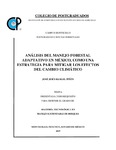| dc.contributor.author | Rangel Piñón, José Jesús | |
| dc.creator | RANGEL PIÑÓN, JOSÉ JESÚS; | |
| dc.date.accessioned | 2020-02-17T17:33:53Z | |
| dc.date.available | 2020-02-17T17:33:53Z | |
| dc.date.issued | 2019-11 | |
| dc.identifier.uri | http://hdl.handle.net/10521/4263 | |
| dc.description | Tesina (Maestría Tecnológica Forestal, especialista en Manejo Sustentable de Bosques).- Colegio de Postagraduados, 2019. | es_MX |
| dc.description.abstract | El cambio climático plantea importantes retos para el país durante el presente siglo; previsiblemente, durante las próximas décadas algunas regiones enfrentarán cambios en el clima que podrían comprometer significativamente sus ecosistemas y biodiversidad. El manejo forestal contribuye a la adaptación al cambio climático, ya que reduce el riesgo de inundaciones y deslaves provocados por eventos climáticos extremos y mejora la infiltración de las áreas con cobertura forestal. La adaptación de las especies, puede reducir las vulnerabilidades y los riesgos asociados con el cambio climático, sin embargo, la adaptación de los bosques requiere fortalecer la silvicultura actual con una nueva visión del manejo forestal basado en ecosistemas forestales, para la toma de decisiones. Por lo tanto, se necesitan herramientas más avanzadas, mecanismos para compartir el conocimiento sobre los impactos y la adaptación, y la promoción de la comunicación, la educación y el intercambio de conocimientos en manejo forestal. En el presente trabajo se realiza una investigación documental de acciones de manejo forestal que se pueden considerar como herramientas de mitigación o adaptación ante los problemas que ocasiona el cambio climático global, revisando además algunos ejemplos que diferentes instituciones como la FAO o diferentes actores a lo largo del tiempo han estudiado en el marco del concepto de manejo adaptativo. Por lo anterior, este análisis de información muestra diferentes enfoques de cómo promover el Manejo forestal adaptativo y utiliza una visión holística ante los nuevos enfoques de la importancia de los bosques pasando de ser proveedores de bienes a ser proveedores de servicios ecosistémicos y su balance. _______________ ANALYSIS OF ADAPTIVE FOREST MANAGEMENT IN MEXICO AS A STRATEGY TO MITIGATE THE EFFECTS OF CLIMATE CHANGE. ABSTRACT: Climate change represents important challenges for the country during this century; it is anticipated, that during the next decades some regions will face changes in climate that could significantly compromise their ecosystems and biodiversity. Forest management might contribute to climate change adaptation, for example, by reducing the risk of floods and landslides caused by extreme climatic events, and by improving the infiltration of areas with forest cover, among others. The adaptation of species can also help to reduce the vulnerabilities and risks associated with climate change; however, the adaptation of forests requires a new vision of forest management based on ecosystems, for decision-making. Consequently, more advanced tools are needed, as well as mechanisms to share knowledge about impacts and adaptation, and promotion of communication, education and the exchange of knowledge in forest management. In this paper, a documentary investigation of forest management actions is carried out that can be considered as mitigation or adaptation tools to the problems caused by global climate change, also reviewing some examples that different institutions such as FAO or different actors throughout of time they have studied within the framework of the concept of adaptive management.
Therefore, this information analysis shows different approaches to how to promote adaptive forest management and uses a holistic view of new approaches to the importance of forests, from being providers of goods to being providers of ecosystem services and their balance. | es_MX |
| dc.format | pdf | es_MX |
| dc.language.iso | spa | es_MX |
| dc.rights.uri | http://creativecommons.org/licenses/by-nc-nd/4.0 | es_MX |
| dc.subject | Resiliencia | es_MX |
| dc.subject | Manejo Forestal Adaptativo | es_MX |
| dc.subject | Cambio Climático | es_MX |
| dc.subject | Manejo de Paisajes | es_MX |
| dc.subject | Resilience | es_MX |
| dc.subject | Adaptive Forest Management | es_MX |
| dc.subject | Climate Change | es_MX |
| dc.subject | Landscape Management | es_MX |
| dc.subject | Ciencias Forestales | es_MX |
| dc.subject | Maestría Tecnológica | es_MX |
| dc.subject.classification | CIENCIAS AGROPECUARIAS Y BIOTECNOLOGÍA::CIENCIAS AGRARIAS::CIENCIA FORESTAL::CONSERVACIÓN | es_MX |
| dc.title | Análisis del manejo forestal adaptativo en México, como una estrategia para mitigar los efectos del cambio climático. | es_MX |
| dc.type | Tesis | es_MX |
| Tesis.contributor.advisor | Reyes Hernández, Valentín José | |
| Tesis.contributor.advisor | Velázquez Martínez, Alejandro | |
| Tesis.contributor.advisor | Hernández de la Rosa, Patricia | |
| Tesis.date.submitted | 2019-11 | |
| Tesis.date.accesioned | 2020 | |
| Tesis.date.available | 2020 | |
| Tesis.format.mimetype | pdf | es_MX |
| Tesis.format.extent | 2,062 KB | es_MX |
| Tesis.subject.nal | Ecosistemas forestales | es_MX |
| Tesis.subject.nal | Forest ecosystems | es_MX |
| Tesis.subject.nal | Silvicultura sustentable | es_MX |
| Tesis.subject.nal | Sustainable forestry | es_MX |
| Tesis.subject.nal | Densidad del rodal | es_MX |
| Tesis.subject.nal | Stand density | es_MX |
| Tesis.subject.nal | Manejo del paisaje | es_MX |
| Tesis.subject.nal | Landscape management | es_MX |
| Tesis.subject.nal | Mascota, Jalisco, México | es_MX |
| Tesis.subject.nal | Ejido "El Llanito", Atenguillo, Jalisco, México | es_MX |
| Tesis.rights | Acceso abierto | es_MX |
| Articulos.subject.classification | Administración forestal | es_MX |
| dc.type.conacyt | masterThesis | es_MX |
| dc.identificator | 6||31||3106||310601 | es_MX |
| dc.contributor.director | REYES HERNÁNDEZ, VALENTÍN JOSÉ; 99343 | |
| dc.audience | generalPublic | es_MX |


